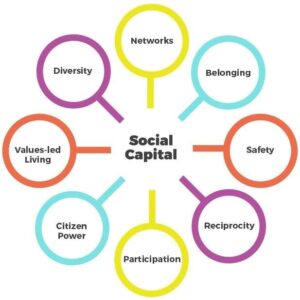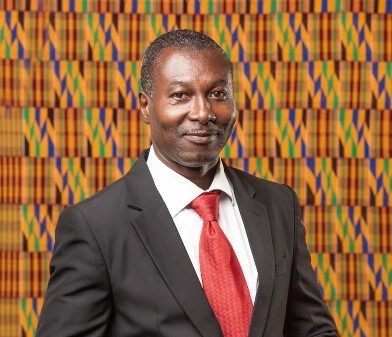- “A man who has friends must himself be friendly, but there is a friend who sticks closer than a brother”- Proverbs 18:24 (ESB).
We all need help from time to time. What help we need may differ from one person to another or with different situations. No one is a complete island. ‘Fellowship’, ‘interdependence’, ‘community’, ‘brotherliness’ and many other words reflect. We rely on each other for comfort, satisfaction, joy, assurance, wisdom, insight and, of course, capital.

Capital is the resource we use to develop or generate wealth or income. Wealth is usually financial but is not limited to that. Non-financial capital can help us generate non-financial wealth. Non-financial capital, the resources from our networks, links and relationships, are very important in business.
Many companies readily employ a certain caliber of people who are deemed to be resourceful because of their networks or their ability to build networks that can lead to more business for their employers – that’s social capital.
What it Means Today
In financial terms, social capital basically comprises the value of social relationships and networks that complement the economic capital for economic growth of an organization. Today, many of us draw strength from our alumni associations- the Akoras, Amanfuos, Abrempongs, Santa Clausians, Old Boys, Old Girls and Adehyes. It is relatively easy to access certain opportunities when we have a connection with the ones who can offer them. Though it is not necessarily the only thing that guarantees success in life; there are countless many who have made it without having to rely on ‘old boyism or girlism’. It is good to have a stepping stone, knowledge and direction. The relevance of social capital cannot be denied.
Social capital helps society to work together and exist in harmony. Instead of disagreements, distrust and disunity, we hold on to mutual dependency and trust. Even in our disagreement on singular issues, we prefer to agree to disagree and let go because of a commonality we share. Social capital provides us with the platform to engage one another and develop even stronger ties. The ties police behaviour and foster positive characters among us. Without them, society would be disjointed and chaotic.
Types of Social Capital
There are three types of social capital: bonding, bridging and linking. They differ in the types of relationships they are based on but they can make or unmake us. No doubt, careful and purposeful attention needs to be paid to nurturing our social capital to ensure we get the best and give the best too.
Bonding social capital refers to connections within a group which has high levels of commonality in demographic characteristics, attitudes and knowledge. This type is the strongest. It could be based on which English Premier League or similar UEFA league team we root for, which church we worship with, where we work, which larger family we belong to or hometown we hail from. It could also be what hobbies we engage in during our pastime. Birds of the same feather flock together. Loosely, monkeys play by sizes, too. At a party thrown by a celebrity, it would be typical to find other celebrities. We would customarily not find teetotalers at a ‘blue kiosk’ joint. These connections and close networks provide members of the group with a sense of belonging, security and help in times of need. It is through these connections that people are willing to associate with and help each other out, as well as expand their network and gain ‘social capital’ among their peers. We are more likely to help someone and go out of our way for someone we have a bond with– as opposed to someone we know nothing about.
Bridging social capital, on the other hand, is made of ties that are comparatively not strong, even among people with similar backgrounds, vocations or belief systems. The connection is made through someone in a closer tie. That ‘someone’ therefore serve as a bridge in our relationship. A good example is a friend of a friend or relation. We usually relate to them indirectly. Bridging, therefore, brings two or more people together who would otherwise not connect– even if they may be from similar groups and have the same interests. The relevance of bridging is that it helps people in a similar group who do not relate well to do so through an intermediary.
In secondary school, especially in the boarding house system, we formed bonds with our classmates and housemates. The ties we formed continue even after school and even when geography distances us. Thanks to social media platforms like Yahoo Groups (earlier), LinkedIn, Facebook and WhatsApp groups, we have rekindled and strengthened many of these bonds. There are friends from way back in Class One we may have re-established contact with and even met with over dinner. We meet to talk about all the years and experiences in between, introducing families we have made and sometimes discovering that our bridges where, of themselves, connected somehow. Some have blossomed into thriving business ventures. Some have led to the pooling of resources to assist alma maters and colleagues who may have fallen into some unfortunate situation.
Linking social capital is similar, in a way, to bridging social capital. There is a ‘link’ between two people or groups of people. The difference, here, is that the ‘link’ connects people of different groups, unlike a ‘bridge’ who connects people of similar groups. Bridging occurs horizontally, i.e. between people of a similar socioeconomic hierarchy. By contrast, linking occurs vertically– between different socioeconomic groups. An example would be a junior student who is connected to a senior student or group through her cousin who is a senior. She would have access to past questions and notes used by those ahead of her to help with her studying.
Likewise, a staunch Real Madrid fan with ties to Barca through a good friend. He connects well with Madrid fans but has a connection with a number of Barca fans with whom he could probably lodge with when he visits Barcelona. Even more clearly distinct is a chance meeting and forming of friendship ties between a lecturer and farm labourer. This could lead to the lecturer bonding with the labourer’s family and friends, engaging in a farming venture and the labourer considering continuation of formal education. Through linking, they penetrate the gap between them and foster new contacts and ties in between ‘social boundaries’ which serves each of them well.
The Avenues
Where do we network and build social capital which is beneficial? Myriads of situations offer these. We all belong to one group or the other. We all have interests, no matter how varied or subdued. We have aspirations which lead us to bond with people of similar persuasion in order to share and to receive.
In Ghana, religious pursuit is a leading reason for us to bond. People who meet often at the mosque on Fridays for prayers and those who congregate at churches to worship bond together on Sundays. Aside religious interests, they may share business openings to help each other. Someone may present you with opportunities that may not be available to the general public, just because he or she associates with you at church or the mosque.
Sports bring many people together and binds fans strongly. We are ardent adherents to the game of football, mostly, in Ghana. Described as the passion of the nation, many of us do not toy with our support for one team or the other and it has a bearing on our emotions and countenance. Those who support our team are ‘brothers’ and ‘sisters’. We bend backwards to accommodate them. Those who are supporters of rival teams are ‘against’ and we sometimes view their intentions with suspicion.
Another thing that gets us to rally around, almost like a religion, is politics. We hold on to our political views and groupings with fervour. It is hard to dissuade us from our entrenched positions when it relates to our support for a particular party. The followers of one party are ready to help each other. This often leads, regrettably, to the notion of nepotism and cronyism (‘family and friends’, as we better know it). Unfortunately, our disdain for opposing views too often gets unhealthy and betrays our ability to be tolerant. Even still, many people have found bridges and links through siblings, spouses and close relatives. These links and bridges often help to dissipate tensions, distrust and simmering agitations.
Added Benefits
Our professional or knowledge-based unions provide platforms for similar bonding. We build social capital through relationships forged in such groupings. We share knowledge to improve our lot. Often, we find jobs or find suitable candidates for job openings in such groupings.
Over a number of repeated purchases of fried rice or chicken wings or pizza, we may develop a bond with the delivery guy. This could lead to more tips, knowledge of special offers coming up, a problem with the product or service or recommendations to some of those in our network for even more purchases. Similarly, a landowner whose garden we take care of could introduce us to even more landowners, thereby expanding our gardening business.
The type of wealth social capital affords is potentially huge. Social capital can do many things when money fails, or even more than money can do. Aside financial benefits, there are many intangibles, non-financial gains to be made through our networks. Let’s rev up our social capital!

ABOUT THE AUTHOR
The Head of OctaneDC Research, Kwadwo Acheampong, has over years garnered experience in fund management and administration, portfolio management, management consulting, operations management and process improvement. For the love of wealth creation and financial freedom for his readers, he writes.
Through his writings Kwadwo has discovered his love and knack to simplify complex theories spicing them with everyday life experiences for the benefit of all. He was recently the resource person of Metro TV’s business show Bottomline, where he shared thoughts on Goal Setting for 2022 from the perspective of financial planning. Feel free to send him your feedback on his article. Kwadwo at [email protected] or call him on +233 244 563 530










